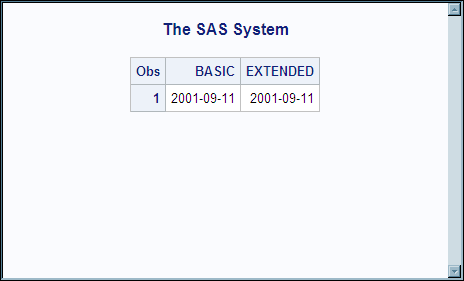Using ISO 8601 SAS Informats and Formats to Import Dates
This simple example
illustrates importing an XML document that contains date values in
both the basic format and the extended format. The XMLMap uses the
FORMAT and INFORMAT elements to specify the appropriate SAS format
and SAS informat in order to represent the dates according to ISO
8601 standards.
<?xml version="1.0" ?>
<Root>
<ISODATE>
<BASIC>20010911</BASIC>
<EXTENDED>2001-09-11</EXTENDED>
</ISODATE>
</Root>The following XMLMap
imports the XML document using the SAS informats and formats to read
and write the date values:
<?xml version="1.0" encoding="UTF-8"?>
<!-- ############################################################ -->
<!-- 2011-01-11T13:20:17 -->
<!-- SAS XML Libname Engine Map -->
<!-- Generated by XML Mapper, 903000.1.0.20101208190000_v930 -->
<!-- ############################################################ -->
<!-- ### Validation report ### -->
<!-- ############################################################ -->
<!-- XMLMap validation completed successfully. -->
<!-- ############################################################ -->
<SXLEMAP description="Reading a Basic and Extended format ISO date field"
name="ISOdate" version="2.1">
<NAMESPACES count="0"/>
<!-- ############################################################ -->
<TABLE name="ISODATE">
<TABLE-PATH syntax="XPath">/Root/ISODATE</TABLE-PATH>
<COLUMN name="BASIC">
<PATH syntax="XPath">/Root/ISODATE/BASIC</PATH>
<TYPE>numeric</TYPE>
<DATATYPE>date</DATATYPE>
<FORMAT width="10">E8601DA</FORMAT> 1
<INFORMAT width="8">B8601DA</INFORMAT> 2
</COLUMN>
<COLUMN name="EXTENDED">
<PATH syntax="XPath">/Root/ISODATE/EXTENDED</PATH>
<TYPE>numeric</TYPE>
<DATATYPE>date</DATATYPE>
<FORMAT>E8601DA</FORMAT> 3
<INFORMAT width="10">E8601DA</INFORMAT> 4
</COLUMN>
</TABLE>
</SXLEMAP>
The following explains the XMLMap syntax that imports the
date values:
| 1 | For the Basic variable, the FORMAT element specifies the E8601DA SAS format, which writes data values in the extended format yyyy-mm-dd. |
| 2 | For the Basic variable, the INFORMAT element specifies the B8601DA SAS informat, which reads date values into a variable in the basic format yyyymmdd. |
| 3 | For the Extended variable, the FORMAT element specifies the E8601DA SAS format, which writes data values in the extended format yyyy-mm-dd. |
| 4 | For the Extended variable, the INFORMAT element specifies the E8601DA SAS informat, which reads date values into a variable in the basic format yyyy-mm-dd. |
